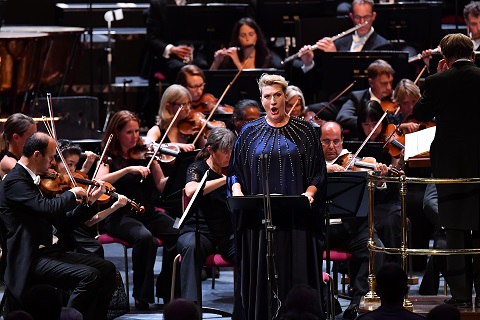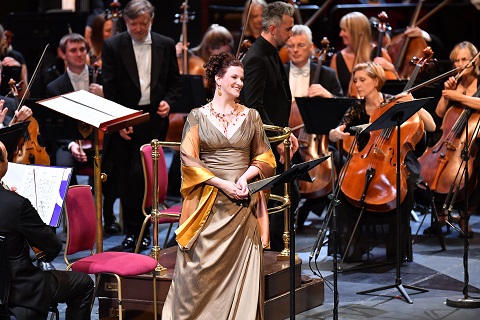Recently in Reviews
English Touring Opera are delighted to announce a season of lyric monodramas to tour nationally from October to December. The season features music for solo singer and piano by Argento, Britten, Tippett and Shostakovich with a bold and inventive approach to making opera during social distancing.
This tenth of ten Live from London concerts was in fact a recorded live performance from California. It was no less enjoyable for that, and it was also uplifting to learn that this wasn’t in fact the ‘last’ LfL event that we will be able to enjoy, courtesy of VOCES8 and their fellow vocal ensembles (more below …).
Ever since Wigmore Hall announced their superb series of autumn concerts, all streamed live and available free of charge, I’d been looking forward to this song recital by Ian Bostridge and Imogen Cooper.
The Sixteen continues its exploration of Henry Purcell’s Welcome Songs for Charles II. As with Robert King’s pioneering Purcell series begun over thirty years ago for Hyperion, Harry Christophers is recording two Welcome Songs per disc.
Although Stile Antico’s programme article for their Live from London recital introduced their selection from the many treasures of the English Renaissance in the context of the theological debates and upheavals of the Tudor and Elizabethan years, their performance was more evocative of private chamber music than of public liturgy.
In February this year, Albanian soprano Ermonela Jaho made a highly lauded debut recital at Wigmore Hall - a concert which both celebrated Opera Rara’s 50th anniversary and honoured the career of the Italian soprano Rosina Storchio (1872-1945), the star of verismo who created the title roles in Leoncavallo’s La bohème and Zazà, Mascagni’s Lodoletta and Puccini’s Madama Butterfly.
Evidently, face masks don’t stifle appreciative “Bravo!”s. And, reducing audience numbers doesn’t lower the volume of such acclamations. For, the audience at Wigmore Hall gave soprano Elizabeth Llewellyn and pianist Simon Lepper a greatly deserved warm reception and hearty response following this lunchtime recital of late-Romantic song.
Collapsology. Or, perhaps we should use the French word ‘Collapsologie’ because this is a transdisciplinary idea pretty much advocated by a series of French theorists - and apparently, mostly French theorists. It in essence focuses on the imminent collapse of modern society and all its layers - a series of escalating crises on a global scale: environmental, economic, geopolitical, governmental; the list is extensive.
For this week’s Live from London vocal recital we moved from the home of VOCES8, St Anne and St Agnes in the City of London, to Kings Place, where The Sixteen - who have been associate artists at the venue for some time - presented a programme of music and words bound together by the theme of ‘reflection’.
'Such is your divine Disposation that both you excellently understand, and royally entertaine the Exercise of Musicke.’
Amongst an avalanche of new Mahler recordings appearing at the moment (Das Lied von der Erde seems to be the most favoured, with three) this 1991 Mahler Second from the 2nd Kassel MahlerFest is one of the more interesting releases.
‘And there was war in heaven: Michael and his angels fought against the dragon; and the dragon fought and his angels, And prevailed not; neither was their place found any more in heaven … that old serpent … Satan, which deceiveth the whole world: he was cast out into the earth, and his angels were cast out with him.’
If there is one myth, it seems believed by some people today, that probably needs shattering it is that post-war recordings or performances of Wagner operas were always of exceptional quality. This 1949 Hamburg Tristan und Isolde is one of those recordings - though quite who is to blame for its many problems takes quite some unearthing.
There was never any doubt that the fifth of the twelve Met Stars Live in Concert broadcasts was going to be a palpably intense and vivid event, as well as a musically stunning and theatrically enervating experience.
‘Love’ was the theme for this Live from London performance by Apollo5. Given the complexity and diversity of that human emotion, and Apollo5’s reputation for versatility and diverse repertoire, ranging from Renaissance choral music to jazz, from contemporary classical works to popular song, it was no surprise that their programme spanned 500 years and several musical styles.
The Academy of St Martin in the Fields have titled their autumn series of eight concerts - which are taking place at 5pm and 7.30pm on two Saturdays each month at their home venue in Trafalgar Square, and being filmed for streaming the following Thursday - ‘re:connect’.
The London Symphony Orchestra opened their Autumn 2020 season with a homage to Oliver Knussen, who died at the age of 66 in July 2018. The programme traced a national musical lineage through the twentieth century, from Britten to Knussen, on to Mark-Anthony Turnage, and entwining the LSO and Rattle too.
With the Live from London digital vocal festival entering the second half of the series, the festival’s host, VOCES8, returned to their home at St Annes and St Agnes in the City of London to present a sequence of ‘Choral Dances’ - vocal music inspired by dance, embracing diverse genres from the Renaissance madrigal to swing jazz.
Just a few unison string wriggles from the opening of Mozart’s overture to Le nozze di Figaro are enough to make any opera-lover perch on the edge of their seat, in excited anticipation of the drama in music to come, so there could be no other curtain-raiser for this Gala Concert at the Royal Opera House, the latest instalment from ‘their House’ to ‘our houses’.
"Before the ending of the day, creator of all things, we pray that, with your accustomed mercy, you may watch over us."
Reviews

02 Sep 2019
Prom 53: Elgar’s emotionally charged Music Makers
British music with an English and strong European accent marked this Prom featuring three well-wrought works, stylistically worlds apart but each characterised by a highly individual musical personality.
The thematic link between Vaughan Williams’sFantasia on a Theme by Thomas Tallis and Hugh Wood’s Scenes from Comus might be simply reduced to sonority - a
fascinating juxtaposition of seamlessly interwoven string forces in one,
and an electrifying alchemy of ever-shifting full orchestral timbres in the
other, their differences adroitly delineated by Sir Andrew Davis in
readings of warmth and precision.
The Fantasia began out of nowhere, wonderfully svelte with Davis
sculpting the air and fashioning handsome playing from the BBC Symphony
Orchestra that encompassed majesty and mystery. Its muted smaller ensemble
at the rear of the stage was daringly quiet but flawlessly integrated into
the bigger picture - everything detail glowing with affection as if the
players were shaking hands with a much-loved friend. One could almost
imagine we were in the sacred space of Gloucester Cathedral where the work
was first performed and where its organist once described Vaughan Williams
as “a queer, mad fellow from Chelsea”.
A similar sense of intensity and nobility emerged from Hugh Wood’s Scenes from Comus. It’s part-cantata and part-orchestral
tone poem with vocal soloists, setting passages from John Milton’s 1634
Masque. Its first appearance at the Proms in 1965 brought the composer
valuable exposure and wide public acclaim. This captivating account was
launched by Martin Owen’s fluent horn solo - the work’s opening tone row
indicative of much that was to follow in a score embracing serialism yet
revealing an expressionistic lyrical strain embedded in a Romantic
sensibility. While Schoenberg was a major stimulus, other influences come
into play most notably in an extended orchestral episode evoking the
monstrous Comus (son of the witch Circe) who invites his followers to join
“a light fantastic round”. It’s a tour de force of orchestral
writing to which the orchestra responded with magnificent playing,
conjuring its orgiastic dance with fierce commitment and evident enjoyment.
There was much to enjoy too from soprano Stacey Tappan and tenor Anthony
Gregory whose clear voices and fluent traversal of the work’s demands made
them ideal advocates, even if on occasion the sheer weight of orchestral
sound pitted against them was not to their advantage.
 Stacey Tappan. Photo credit: BBC/Chris Christodoulou.
Stacey Tappan. Photo credit: BBC/Chris Christodoulou.
Where Scenes from Comus arises from the beginning of Wood’s
musically creative outpouring, The Music Makers (1912) was to be
one of Elgar’s last works for choir and orchestra and has been unjustly
overlooked. Setting Arthur O’Shaughnessy’s Ode for a contralto soloist,
it’s sometimes regarded as a problematic work in that the newly composed
themes rarely achieve the same memorable status as the patchwork of
quotations (most notably drawn from the ‘Enigma’ Variations) and, arguably,
suggests a diminishing imagination. Critical assessment has not been helped
by Elgar’s biographer Diana McVeigh’s patronising comment on The Music Makers as being a “pleasant work to sing but not quite
so satisfying to listen to”.
While O’Shaughnessy’s fanciful text is not always rewarding (“With
wonderful deathless ditties we build up the world’s great cities” being
especially lame), this scrupulously prepared performance with the BBC
Symphony Chorus and a radiant Dame Sarah Connolly made a compelling case
for this cantata. The opening lines “We are the music-makers, and we are
the dreamers of dreams” were sung with a rapt beauty and conveyed with deep
involvement. True, the pianissimo marking was ignored (not so on
the superb Chandos recording) but the words were clearly enunciated and
shaped. Thereafter, Davis drove the score forward, rarely allowing its
momentum to falter and seamlessly interrogating tempo variations, shaping
its paragraphs with assurance and building from “for we fashion an empire’s
glory” to a grandiose climax. Connolly imposed with warmly expressive tone,
and if the upper register didn’t quite have same easy control and richness
as her voice below the stave, she sang with a total immersion in the text
that compels attention. Nowhere was her singing so poignant as the closing
lines; “And a singer who sings no more” - its emotional charge shattering.
David Truslove
Dame Sarah Connolly (mezzo), Stacey Tappan (soprano), Anthony Gregory
(tenor), Sir Andrew Davis (conductor), BBC Symphony Orchestra, BBC Symphony
Chorus
Royal Albert Hall, London; Thursday 29th August 2019.

